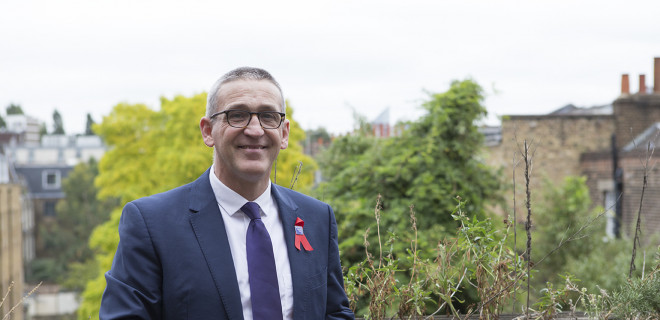This World AIDS Day – with our excellent partners at National AIDS Trust and the Elton John AIDS Foundation – we launched the findings of the independent HIV Commission.
Dame Inga Beale and her fellow commissioners were tasked with coming up with a blueprint for making the goal to end new transmissions in England by 2030 a reality. They did not disappoint. Implement the commission’s recommendation and England could be the first country to end new transmission.
In the last few years, our organisation and our partners have turned a new scientific possibility into Government policy. In just a year, the Commission has turned that policy into a practical plan.
Hot on the heels of the main COVID-19 story, Tuesday wasn't just World AIDS Day but also the publication of our HIV Commission report and its findings: that England to be the first country to end new cases; a new target to reduce by 80% those living undiagnosed with HIV by 2025; annual reporting to parliament; and, normalise HIV testing across the NHS.
You couldn't move for coverage. Pick an outlet – whether it is BBC News, Channel 4 or Sky through to the Daily Mirror, The Times and Daily Telegraph – we had spokespeople on television, radio and in print.
We brought a diversity of viewpoints to the coverage – see Mercy Shibemba, Chamut Kifetew, Florence Eshalomi MP, Trevor Banthorpe and this brilliant interview on PinkNews.
Even The Duke of Sussex, Prince Harry, warmly welcomed the recommendations for achieving our 2030 goal, saying ‘for the first time there is vision and clarity on how we can get there’.
And what was great is that our message was heard in the corridors of power.
The prime minister Boris Johnson backed our vision of ending new cases of HIV before the decade is out.
On #WorldAIDSDay we remember those who have died of AIDS and stand with those living with HIV today.
— Boris Johnson (@BorisJohnson) December 1, 2020
Our aim is to end HIV transmission by 2030 and help better the lives of HIV+ people with quick access to antiretroviral therapies and the roll out of PrEP across the country.
The Chancellor of the Exchequer Rishi Sunak went even further and endorsed the commission report on the floor of the House of Commons. This is almost unheard of.
Today is #WorldAIDSDay, read more here: https://t.co/ZGkDUu6jJa
— Rishi Sunak (@RishiSunak) December 1, 2020
As we remember those we have lost, we also remind ourselves of the need for further action.
I'm proud of our policy to end new HIV transmissions by 2030, a commitment reaffirmed today at the HIV Commission launch pic.twitter.com/0BcAGyNrBW
At the launch event the Chancellor of the Duchy of Lancaster, Michael Gove, spoke and promised annual reporting to parliament on the 2030 goal, interim targets and the chance of England being the first nation to achieve this goal.
Then the Health Secretary, Matt Hancock went one better and accepted the needs for new targets – to reduce by 80% those living undiagnosed with HIV by 2025 – and promised to increase HIV testing.
His deputy, Lord Bethell, Health Minister in the House of Lords, said the Department for Health and Social Care would look into ‘normalising testing’ and promised new funding was forthcoming.
We welcome the commitment from Health Minister @JimBethell that @DHSCgovuk will announce funding details to support frontline local sexual health services in the coming weeks.
— Terrence Higgins Trust (@THTorguk) December 1, 2020
These services are the cornerstone in the fight against HIV and can help ensure #0HIVby30 pic.twitter.com/ZMAGqh3une
The day ended with a debate in parliament organised by commissioners Steve Brine MP (Conservative) and Wes Streeting MP (Labour). Hancock returned to make yet another commitment: that the HIV Commission would be the basis of a HIV Action Plan available ‘as early next year as is feasible to ensure that the work is high quality, can be delivered and can set us fair on a credible path to zero new transmissions in 2030’.
JUST IN. ? @MattHancock commits to driving forward the recommendations of today’s #HIVCommission.
— Terrence Higgins Trust (@THTorguk) December 1, 2020
“We will use the excellent report of the HIV Commission as the basis of our HIV Action Plan, which I commit to publishing next year.”
A big moment in the fight against HIV. pic.twitter.com/5h01h1BVmg
The words of the commission were turned into Government policy within a matter of hours of being published, a truly remarkable achievement.
The support was cross party too. Opposition leader Sir Keir Starmer joined the launch and gave his backing to the commission and its recommendations.
This combination is better than anyone of us hoped for.
As ever, the hard work starts now. Words need to become deeds. My team at Terrence Higgins Trust won't stop until our vision becomes reality.
To everyone who supports, donates to our work, today shows that together we can achieve so much and end new transmissions. Your efforts have and will change lives. We're genuinely grateful to have you involved.



